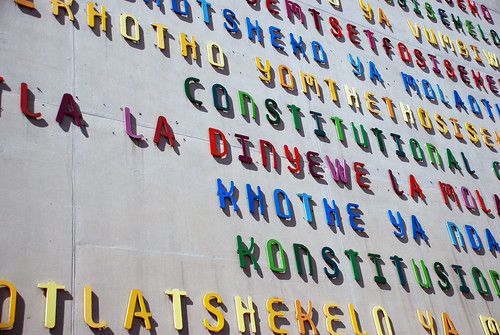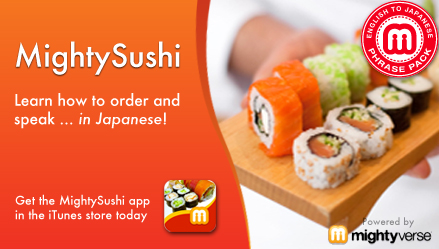I write this as I listen to “Change” by Miwa, which has
transformed from a series of nonsense syllables to something I can recognized as
Japanese but still not understand. A year ago, I knew how to:
- Count to 5 (which I learned when I visited Japan when I was 10)
- Say いただきます。
(“ittedakimas” which I incorrectly remembered as “let’s
eat” but actually means “thank you for the meal” which you say
before you eat.
- Say and type こんにちは
(“konnichiwa” which I learned so that I could verify that Laszlo Mail
accepted double-byte characters as input text and rendered them corrected)
Early use case testing of Mightyverse showed that it resonated with people who already
had some dual language fluency. People who had no knowledge of the language found it
quite frustrating. The initial Mightyverse iPhone app had neither the software features
nor range of language that language learners or travelers wanted. Nonetheless, when our
Japanese investor came to visit, I decided to try using Mightyverse to learn Japanese. I
picked a single phrase: “a frog
in the well does not know the great sea.” In learning the phrase, I wanted
to know what each word meant, so I asked my colleague, Ikuko, to break it down for me.
Then I promptly forgot all but the meaning of the whole phrase except the first word
(“ino” which means “in a well” since I found it surprising that
such a big concept would be known by such a short word). I proceeded to learn the phrase
phonetically, until I could successfully parrot it.
I then experienced the frustration and joy of a language learner with an interesting
twist. When I spoke this phrase to my American friends who knew Japanese they listened
carefully and might be able to understand one or two words, but not understand the
meaning of the phrase. They would then say some simple conversation starter to me, of
which I understood not one word, to my enormous frustration. However, when I said this
phrase to a native Japanese speaker, he or she would immediately smile and nod and often
finish the sentence with me. Suddenly we would have something in common and they would
tell me in English about where they learned the phrase or about the original Chinese
poem or share something about the well-known poet. I delighted to experience a part of
the Mightyverse vision made real. I proceeded to learn phrase #2: “I’m
sorry I speak the Japanese of a pre-schooler.” This phrase wasn’t as
successful in creating connections, but introduced me to Japanese sentence structure.
A few months ago I submitted a talk to Ruby
Kaigi, about language and unicode and web applications. (I felt the proverb fit
the topic, so I made my first Japanese phrase the title of the talk.) A few weeks ago, I
decided to start learning Japanese in earnest with twice weekly Japanese classes. Our
teacher instructed us to learn to read and write Hiragana as part of her lessons. She
claimed this would help us speak and I bravely ventured forth.
Since I spend quite a bit of time on muni, I decided to try a few iPhone apps to learn
conversation and reading. My two favorites are iStart
Japanese and Human
Japanese.  Each
also has a free version that you can start with and provides a substantial amount of
learning before you need to buy the full version for further lessons. They are quite
different and both are complimentary to each other, to the language classes and to
Mightyverse. I have found that I learn best when I can learn the same concept in many
different ways and I have found that to be true of language more than most things.
Each
also has a free version that you can start with and provides a substantial amount of
learning before you need to buy the full version for further lessons. They are quite
different and both are complimentary to each other, to the language classes and to
Mightyverse. I have found that I learn best when I can learn the same concept in many
different ways and I have found that to be true of language more than most things.
iSpeak Japanese is a wonderful introduction to conversation as well as written Japanese.
The teaching patterns for conversation were very effective for me. I also love how you
can toggle the writing between hiragana and roman characters and that they introduce the
Kanji with the writing as well. I don’t really feel like it is sticking in my
brain yet, but I enjoy working through the exercises and the quizes do seem to help. My
only disappointment is with the pronunciation — I have heard from two native
Japanese speakers that they do not really say the “su” at the end of a word
like “nomimasu” (which is instead pronounced “nomimas”). It
seems odd that a language program would teach conversation and not address this common
pattern.
 Human Japanese is a
lovely application that interleaves cultural lessons with language lessons, starting
with the hiragana characters. The attention to detail is very lovely and the pacing of
the application is comfortable. The notes, gestural drawings and animated strokes really
help me understand how to write the characters where my old-fashioned paper workbook
didn’t give me enough of a clue. I highly recommend this exploration of Japanese
culture and language for the new Japanese language learner.
Human Japanese is a
lovely application that interleaves cultural lessons with language lessons, starting
with the hiragana characters. The attention to detail is very lovely and the pacing of
the application is comfortable. The notes, gestural drawings and animated strokes really
help me understand how to write the characters where my old-fashioned paper workbook
didn’t give me enough of a clue. I highly recommend this exploration of Japanese
culture and language for the new Japanese language learner.
While Mightyverse does not target beginner language learning, it does prove to be an
effective complement. I turn elsewhere, whether it be friends, classes or language
learning aids, to learn to fundamentals of sentence structure and simple vocabulary.
From Mightyverse, I am inspired to learn more complex and entertaining or specialized
phrases and to hear pronunciation from real native speakers.







 Each
also has a free version that you can start with and provides a substantial amount of
learning before you need to buy the full version for further lessons. They are quite
different and both are complimentary to each other, to the language classes and to
Mightyverse. I have found that I learn best when I can learn the same concept in many
different ways and I have found that to be true of language more than most things.
Each
also has a free version that you can start with and provides a substantial amount of
learning before you need to buy the full version for further lessons. They are quite
different and both are complimentary to each other, to the language classes and to
Mightyverse. I have found that I learn best when I can learn the same concept in many
different ways and I have found that to be true of language more than most things. Human Japanese is a
lovely application that interleaves cultural lessons with language lessons, starting
with the hiragana characters. The attention to detail is very lovely and the pacing of
the application is comfortable. The notes, gestural drawings and animated strokes really
help me understand how to write the characters where my old-fashioned paper workbook
didn’t give me enough of a clue. I highly recommend this exploration of Japanese
culture and language for the new Japanese language learner.
Human Japanese is a
lovely application that interleaves cultural lessons with language lessons, starting
with the hiragana characters. The attention to detail is very lovely and the pacing of
the application is comfortable. The notes, gestural drawings and animated strokes really
help me understand how to write the characters where my old-fashioned paper workbook
didn’t give me enough of a clue. I highly recommend this exploration of Japanese
culture and language for the new Japanese language learner.